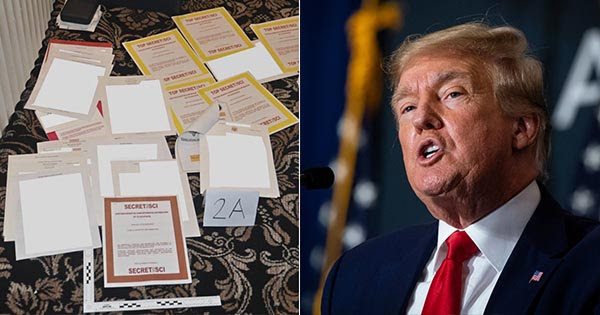On Tuesday, the Department of Justice filed its response to the request that a “special master” be appointed to independently review the documents seized during the raid of former President Donald Trump’s Mar-a-Lago residence, saying that classified documents were likely “concealed” in the estate in violation of a grand jury subpoena. As part of their filing, they released a staged photo of documents that were seized.
“Of most significant concern was that highly classified records were unfoldered, intermixed with other records, and otherwise unproperly [sic] identified.” Id. (internal quotations omitted). The NARA Referral was made on two bases: evidence that classified records had been stored at the Premises until midJanuary 2022, and evidence that certain pages of Presidential records had been torn up.”
The filing stated that personal effects are not subject to return, citing several reasons including that the evidence of “commingling personal effects with documents bearing classification markings is relevant evidence of the statutory offenses under investigation.”
“During the August 8 Execution of the Search Warrant at the Premises, the Government Seized Thirty-Three Boxes, Containers, or Items of Evidence, Which Contained over a Hundred Classified Records, Including Information Classified at the Highest Levels,” the filing said.
The DOJ said that they discovered three classified documents that were being held in a “desk drawer.”
The filing also fights back against claims by Trump that the seized documents had been covered by executive privilege.
“The former President cites no case—and the government is aware of none—in which executive privilege has been successfully invoked to prohibit the sharing of documents within the Executive Branch,” it said.
According to Fox News, Trump’s lawyers had claimed before the search warrant was obtained that records that remained at Mar-a-Lago from the White House had been stored in a secure storage room at the residence.
The filing though states that documents were likely “concealed and removed from the Storage Room and that efforts were likely taken to obstruct the government’s investigation.”
The filing states that the warrant had been obtained after “the government developed evidence that a search limited to the Storage Room would not have uncovered all the classified documents at the Premises.” The heavily redacted affidavit that was made public after a judge’s order exhibited that the DOJ was concerned that documents were being stored improperly at Mar-a-Lago.
It DOJ filing released late Tuesday also stated that twice as many documents with classification markings had been recovered compared to documents discovered and returned in June.
“That the FBI, in a matter of hours, recovered twice as many documents with classification markings as the ‘diligent search’ that the former President’s counsel and other representatives had weeks to perform calls into serious question the representations made in the June 3 certification and casts doubt on the extent of cooperation in this matter,” the filing states.
In regards to the appointment of a special master, the Department of Justice argued that the request from Trump “fails for multiple, independent reasons,” saying it’s both “unnecessary” and would “harm national security interests.” The DOJ had previously said that since the FBI already reviewed the documents, there was no need for oversight of that process.
The special master that is being considered for appointment by a judge is for review of the documents that were already seized by the FBI during the August 8 raid, about which there are concerns that privileged documents are included.
The filing also states that Trump “lacks standing” for a special master in this case because the documents in question reportedly belong to the United States, and not to him, according to Fox News.
The department said that Trump would not suffer any injury without an injunction “and the harms to the government and the public would far outweigh any benefit” to him.
In regards to documents covered under attorney-client privilege, discovered during the FBI review of the seized records, the department stated that the government’s filter team has already separated out these documents.
“Furthermore, appointment of a special master would impede the government’s ongoing criminal investigation and—if the special master were tasked with reviewing classified documents—would impede the Intelligence Community from conducting its ongoing review of the national security risk that improper storage of these highly sensitive materials may have caused and from identifying measures to rectify or mitigate any damage that improper storage caused,” the filing said.
“Lastly, this case does not involve any of the types of circumstances that have warranted appointment of a special master to review materials potentially subject to attorney-client privilege.”
In the search, FBI agents reportedly discovered five confidential-marked documents, 16 documents marked as secret, and 17 marked as top secret.
“Counsel for the former President offered no explanation as to why boxes of government records, including 38 documents with classification markings, remained at the Premises nearly five months after the production of the Fifteen Boxes and nearly one-and-a-half years after the end of the Administration,” the filing states.
In January of this year, Trump’s team had returned 15 boxes of materials to the National Archives and Records Administration.
On Saturday, US District Judge Aileen M. Cannon from the Southern District of Florida announced her intent to appoint a special master to independently review the documents taken from he residence, citing “the exceptional circumstances presented.”



No comments:
Post a Comment